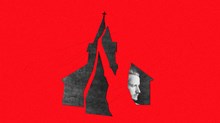A new study reports that one in eight adults in Northern Ireland are evangelicals. These born-again Christians, like those in America, hold more conservative beliefs and are more committed to their churches than other Protestants.
A 2008 study by Claire Mitchell from Queen's University in Belfast and James Tilley of Jesus College, Oxford University, provide a snapshot of conservative Protestants in Northern Ireland. Using the 2004 Northern Irish Life and Times Survey, Mitchell and Tilley find that there are almost no differences between denominations. Instead, what matters is whether Protestants identify as "a born-again Christian" or "evangelical."
Evangelicals are a smaller group in Northern Ireland than in the United States. Northern Ireland could be divided into three religious groups of roughly equal size. There are Catholics (37 percent), those who say they have no religion or for whom "Protestant" is primarily an ethnic (not religious) identity (29 percent), and Protestants who have at least some religious involvement (34 percent).
Of this religiously committed Protestant group, one-third are evangelicals and two-thirds are "mainline." This means that around 12 percent of Ulster identifies as born-again or evangelical. (Using the same survey questions in the U.S., one would find around 40 percent would identify as such.)
An important difference between evangelicals in the U.S. and those in Ulster is the place of evangelicals within denominations. The three largest Protestant denominations in N.I. are Presbyterian (42 percent), Church of Ireland (31 percent) and Methodist (10 percent). The remaining churches are nondenominational, Pentecostals, or the Free and Reformed Presbyterian Church (whose members have played a large role in politics despite making up only three percent of Protestants).
Unlike the U.S. where denominations have organized themselves around being more evangelical (e.g., Presbyterian Church in America) or mainline (e.g., Presbyterian Church in the USA), evangelicals in Ulster are found throughout all of the denominations, and in roughly the same proportions. While smaller denominations are more evangelical than the larger churches, the larger groups still have a large proportion who identify as born-again or as evangelical.
Where Ulster evangelicals stand out from their fellow Protestants is in their commitment to traditional religious practices and beliefs. About one-third of Protestants attend church at least once a week. However, between 60 and 80 percent of evangelicals attend church every week. Evangelicals are more likely than other Protestants to believe in a personal God or to believe in the veracity of the Bible. And when asked questions about premarital sex, adultery, same-sex sexual relations, or abortion, evangelicals are more likely to take morally conservative stances. In short, evangelicals in Northern Ireland, like those in the U.S., are more likely to have more traditional beliefs and practices than other Protestants.
Evangelicalism is too often seen as an American-only phenomenon or as a growing movement in Asia, Central America, or Sub-Saharan Africa. Frequently overlooked are evangelicals in places such as Australia, continental Europe, or the United Kingdom. Mitchell and Tilley study shows that even in a region where religion is too often viewed in stark, ethnic-like terms, there may be evangelicals who act and believe differently than other Protestants. Evangelicals may be most influential in the United States, but they are important in other countries. Hopefully, other researchers will continue this line of research and examine evangelicals in other countries, too.
Claire Mitchell is a lecturer in Sociology at Queen's University Belfast and is author of Religion, Identity and Politics in Northern Ireland (Ashgate). James Tilley is a University Lecturer at Jesus College, Oxford University. "Disaggregating Conservative Protestant Groups in Northern Ireland" was published in the December 2008 issue of the Journal for the Scientific Study of Religion.

Support Our Work
Subscribe to CT for less than $4.25/month


















